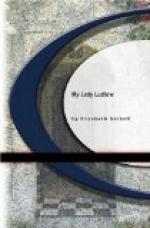Day after day Mr. Smithson seemed to grow more fidgety, more annoyed at the state of affairs. Like every one else employed by Lady Ludlow, as far as I could learn, he had an hereditary tie to the Hanbury family. As long as the Smithsons had been lawyers, they had been lawyers to the Hanburys; always coming in on all great family occasions, and better able to understand the characters, and connect the links of what had once been a large and scattered family, than any individual thereof had ever been.
As long as a man was at the head of the Hanburys, the lawyers had simply acted as servants, and had only given their advice when it was required. But they had assumed a different position on the memorable occasion of the mortgage: they had remonstrated against it. My lady had resented this remonstrance, and a slight, unspoken coolness had existed between her and the father of this Mr. Smithson ever since.
I was very sorry for my lady. Mr. Smithson was inclined to blame Mr. Horner for the disorderly state in which he found some of the outlying farms, and for the deficiencies in the annual payment of rents. Mr. Smithson had too much good feeling to put this blame into words; but my lady’s quick instinct led her to reply to a thought, the existence of which she perceived; and she quietly told the truth, and explained how she had interfered repeatedly to prevent Mr. Horner from taking certain desirable steps, which were discordant to her hereditary sense of right and wrong between landlord and tenant. She also spoke of the want of ready money as a misfortune that could be remedied, by more economical personal expenditure on her own part; by which individual saving, it was possible that a reduction of fifty pounds a year might have been accomplished. But as soon as Mr. Smithson touched on larger economies, such as either affected the welfare of others, or the honour and standing of the great House of Hanbury, she was inflexible. Her establishment consisted of somewhere about forty servants, of whom nearly as many as twenty were unable to perform their work properly, and yet would have been hurt if they had been dismissed; so they had the credit of fulfilling duties, while my lady paid and kept their substitutes. Mr. Smithson made a calculation, and would have saved some hundreds a year by pensioning off these old servants. But my lady would not hear of it. Then, again, I know privately that he urged her to allow some of us to return to our homes. Bitterly we should have regretted the separation from Lady Ludlow; but we would have gone back gladly, had we known at the time that her circumstances required it: but she would not listen to the proposal for a moment.
“If I cannot act justly towards every one, I will give up a plan which has been a source of much satisfaction; at least, I will not carry it out to such an extent in future. But to these young ladies, who do me the favour to live with me at present, I stand pledged. I cannot go back from my word, Mr. Smithson. We had better talk no more of this.”




